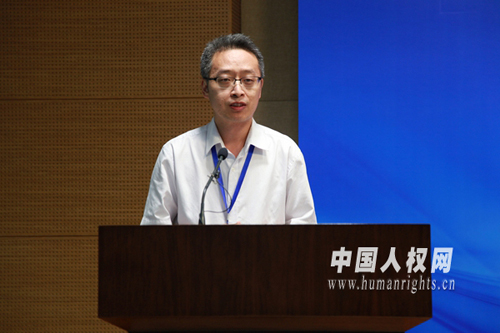
June 14, 2017 -- Liu Huawen, executive director and researcher of the Research Center for Human Rights, Chinese Academy of Social Sciences, delivers a speech. Photo: Jiao Fei/ chinahumanrights.org
June 14, 2017 -- The Seminar on Building a Community of Shared Future for Mankind and Global Human Rights Governance was held in Nankai University, Tianjin on June 8th. It was co-sponsored by China Society for Human Rights Studies and the Publicity Department of Tianjin and organized by Nankai University. During the seminar, Liu Huawen, executive director and researcher of the Research Center for Human Rights, Chinese Academy of Social Sciences put forward that the socialism human rights theory with Chinese characteristics has achieved great breakthroughs. China has demonstrated its determination to promote the sound development of human rights cause both home and abroad and have a say in global human rights governance. Professor Liu accepted the interview of chinahumanrights.org.
chinahumanrights.org: what are the opportunities and challenges faced by global human rights cause under today’s international situation?
Professor Liu: stepping into the 21st century, both of peace and development have been achieved and the advance in science and technology including the application of Internet and telecommunication has created favorable conditions for improving people’s living standard. But at the same time, the regional armed conflicts and wars break out frequently. Many new challenges such as refugee problems faced by Europe and regional issues faced by some African and Latin American countries when on their way to modernization arise with the old ones unsolved. The United Nations Secretary-General António Guterres said on February 27th that today’s international situation is more unpredictable. So the development of human rights cause is quite remarkable. Generally, opportunities and challenges are co-existing.
In such a situation, the focus of the international community is anti-globalization trend. Some western countries, the US in particular, embrace protectionism. The US stresses its interests in trade and investment fields but runs away from international responsibilities. Recently, the US ambassador to the UN said that the US government is considering quitting the UN Human Rights Council, which shocked the international community including some developed countries. It is a signal that the US is negative about multilateral mechanism and UN human rights efforts, which is adverse to the sustainable development of international community. On the contrary, China put forward the idea of building a community of shared future for mankind to meet the demand of world development. The Belt and Road Initiative practiced by China has greatly promoted world development and the idea of building a community of shared future for mankind also boosts the international cooperation for human rights.
chinahumanrights.org: what are the changes of attitude and role of China in developing human rights cause both home and abroad? Is there any promotion of China’s international status in human rights?
Professor Liu: China has adhered that human rights is a common ideal for people all over the world. Domestically, China has adhered to prioritize people’s rights to exist and rights to development and promote the development of human rights comprehensively. On the base of law, China has gradually developed a path for human rights development with Chinese characteristics. Internationally, China has been advocating that the dialogues and cooperation should be based on sovereign equality and mutual respect. With the enhancing of comprehensive national strength, China has been increasingly involved in international exchanges of human rights and providing more foreign aid. Especially the idea of building a community of shared future for mankind has been listed in the resolutions of the UN, the Security Council, and the Human Rights Council. That is the theoretical contribution of China to the development of international human rights cause.
chinahumanrights.org: Please explain the conception of “mainstreaming of human rights” you mentioned. What is the relation between it and building a community of shared future for mankind?
Professor Liu: Mainstreaming of human rights is a slogan and basic policy put forward by the UN in 1990s. It is the first topic of high level discussion in the 34th meeting of Human Rights Council in 2017. To put it simply, mainstreaming of human rights means that the formulation of implementation of policies and laws should take human rights into consideration. The whole process should be helpful to the human rights development. The purpose to promote human rights has been involved in all the efforts of the General Assembly, the Security Council, and the Secretary-General. In China, we also consider the effects to human rights when formulating policies and laws and make sure the efforts are not just human rights-related, but to promote it actively, and this is the mainstreaming of human rights. Building a community of shared future for mankind is a huge systematic project and we should involve human rights into it to promote human rights development.
chinahumanrights.org: you mentioned that the basic position of China in human rights protection is quite consistent with that of the UN. Please give us a brief introduction.
Professor Liu: China proposes to promote human rights comprehensively and choose a development path based on national conditions. China believes that there is no best only better in human rights. Human rights dialogues and cooperation should be based on mutual respect. China supports the efforts of the UNHRC on the principle of objective, fair, non-political, non-selective and non-antagonistic. In particular, the idea of building a community of shared future for mankind lays a foundation for international exchange and cooperation in human rights protection, which has demonstrated the attitude of a responsible major country.


